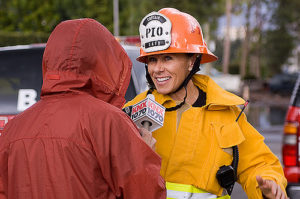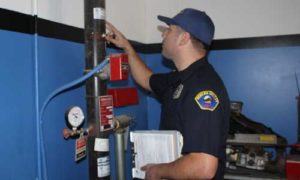By: Robert Avsec, Executive Fire Officer
In my previous posts, 15 Strategies for Success in a Fire Department Staff Position and 9 More Strategies for Success  in a Fire Department Staff Position and I provided my thoughts on how a fire officer can be more successful when they transfer to their first staff officer assignment within their fire department. Today, I’m going to offer my perspectives on the “flipside”: Returning to a new assignment in emergency operations.
in a Fire Department Staff Position and I provided my thoughts on how a fire officer can be more successful when they transfer to their first staff officer assignment within their fire department. Today, I’m going to offer my perspectives on the “flipside”: Returning to a new assignment in emergency operations.
Before getting into the details, a word of caution based on my experiences (which totaled almost 10-years of staff officer experience through four staff officer assignments during my 26-year career). You’re going to be viewed by some of your colleagues as “weird”, especially if you volunteered for the assignment. Who leaves “real firefighting” to “ride a desk”?
Whether you volunteered for the staff officer assignment or you were given the assignment, I think you’re going to find that many of your bosses, peers, and subordinates in operations are going to view you as a “newbie”. They’re going to expect you to “prove yourself” as being capable of handling your new assignment in operations.
Prep for that next job
When I was transferred to my first staff officer assignment, I said to myself that I was going to stay abreast of everything going on in operations so that I would be ready to return. That didn’t happen.
I was assigned as the only uniformed officer assisting our new EMS Director in standing up a new EMS Division within our department. The work was exciting, rewarding, and at the same time all-consuming. It didn’t take long for that “staying in touch” to fall by the wayside.
So, before your hitch in a staff officer position is up, begin preparing yourself to make that transition:
- Find out what’s hot. Review new policies and procedures that have come out since you left operations. Talk with your colleagues in operations and find out what priorities are being communicated to them by their bosses.
- Brush up on you command and control skills, including ICS. Refresh yourself with the terminology, roles and responsibilities, and expectations that will go with your new assignment. Or likely new assignment, since your department is unlikely to give you any heads-up on what that assignment until the last possible date.
Start compiling a Continuity File for your future replacement.
Ideally, you should do this from Day #1 of your staff officer assignment, but realistically you won’t. So, start by:
- Documenting the roles and responsibilities for you job. Not the ones that may have been given to you by your supervisor, the ones that you’ve really been doing day in and day out.
- Making copies of those reports that you’re responsible for completing on a regular basis.
- Making copies of any special reports or assignments that you completed.
- Making a contact list for key people—inside and outside your department—that have been helpful in doing your job successfully.
Now you’re back in Operations
Quoting Tim McGraw’s popular song, “Be humble and kind.” Accept that you’re on the front end of a new learning curve. The onus is on you to listen and learn from your direct reports, peers, and your new boss. It’s a whole new set of interpersonal dynamics.
You’re likely returning with a new skill set and a better knowledge and understanding of the division or work unit you’ve just left and how it contributes to the success of your organization. Put it this way: you’ve earned a bunch of new currency in that job, but you can’t spend it in your new job until you’ve “converted it” into the currency used in operations.
Exercise caution—and sometimes restraint—in voicing your opinions on the current state of affairs in operations that can come with your newfound wisdom. Help others to understand, not make yourself understood. Use your talents to have a positive influence on how people in operations view your former division or work unit and the people who work there.
Be a mentor and coach
Use your newfound “powers” for good! Try to have a positive influence on how other fire officers and firefighters view staff officer assignments. Help them to see that while operations may be the “big dog” in your organization, it’s not the only “dog in the fight.”
staff officer assignments. Help them to see that while operations may be the “big dog” in your organization, it’s not the only “dog in the fight.”
Take every opportunity to encourage others to follow in your footsteps. Sure, working every day was a hassle and the workload was never-ending. But I always found that the “ups” more than outnumbered the “downs” in every staff officer assignment I ever had. So, emphasize the positive and reduce the negatives (They’ll find out about all the negatives when they get there!).
As you’ve no doubt learned, staff officer positions have a valuable function in your department and play a key role in helping meet the total mission. The future success of your department will depend upon fire officers—like yourself—to volunteer for those assignments or willingly accept an assignment they receive. Think of yourself as a recruiter!
Plan to do it again
Unless your staff officer assignment was a capstone to your career with your department, it’s likely that you’ll have other opportunities to “take a walk on the other side.” So, take the initiative and learn what other staff officer opportunities you find interesting for the future. Two of my staff officer assignments were given to me and I volunteered for two of them; though I enjoyed all of them, the ones I picked were the “sweetest”.
So, don’t wait until the last-minute to prepare yourself for re-entry to operations within your department. I believe that if you follow the advice I’ve laid out, you’ll find that your “landing” in operations will be much softer.
 Fire & EMS Leader Pro The job of old firefighters is to teach young firefighters how to become old firefighters!
Fire & EMS Leader Pro The job of old firefighters is to teach young firefighters how to become old firefighters!